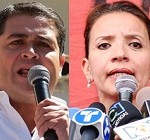While the Chilean elections have brought the Left back to power, the elections held in Honduras in November returned to power the right-wing National Party (NP). The NP colluded with the military coup and ouster of the democratically-elected President Manuel Zelaya in 2009.
If Chile is an inspiration for 21st century Latin America, Honduras is a reminder of the bad old times of the last century, of coups and conspiracies.
In the elections held on 24 November 2014, Juan Orlando Hernandez of the NP was declared the winner by the electoral authority of Honduras. Hernandez got 36.8% of the votes; his main rival, Xiomara Castro, the centre-left candidate of the Libre party, got 28.8%. She is the wife of ex-president Zelaya. She has alleged irregularities in the counting and has rejected the official results. She has claimed victory and her supporters have been protesting in the streets.
In response, the electoral authority has agreed to a recount in some cases. But the Libre party disagrees with the electoral authority’s proposed method of recounting. So there will be more street protests and uncertainty for some time. However, the chances of Xiomara Castro winning the election after a recount are slim, given the overwhelming strength of the right-wing forces, including the military.
Honduras is the only Latin American country to have had a coup in the 21st century. President Zelaya was ousted in a military coup in 2009, put on a plane and dropped in Costa Rica as an exile. The conservative NP, supported by its U.S. patrons, orchestrated the coup. Zelaya was overthrown ostensibly because he was trying to seek re-election through a referendum. However, the real reason for the coup was to punish him for being close to Chavez and send a message to other pro-Chavez presidents in the region.
Crime is rampant in Honduras, with 82 murders for every 100,000 people, and 20 murders a day. The ruthless Mara gangs, said to have tens of thousands of members, strike terror all over the country, and are involved in drug and human trafficking. President-elect Hernandez has promised tough measures to deal with the crime, by putting the military and more police on the streets.
Many Hondurans emigrate to escape the terror; 15%-20% of the country’s GDP comes from the remittances of Hondurans who work abroad. In the U.S. alone, there are over 700,000 Hondurans.
Honduras is one of the poorest countries in the region. About 60% of the population lives below the poverty line. In contrast to most other Latin American governments, which have pro-poor policies and programmes, poverty alleviation is not a priority for the conservative party that has won the election. This means that there is no immediate hope for Hondurans who are poor.
Honduras is the second biggest coffee producer of Central America and an important banana exporter. The country is diversifying into textiles and exporting to the U.S., taking advantage of the free trade agreement with the U.S.
President-elect Juan Hernandez is expected to begin his term from 27 January 2014. Given the internal political rivalries in Honduras, will he have the time or inclination to combat the high crime rate and try to bring down the widespread poverty in his country?
Ambassador Viswanathan is Distinguished Fellow, Latin America Studies, Gateway House. He is the former Indian Ambassador to Argentina, Uruguay, Paraguay and Venezuela, and Consul General in Sao Paulo.
This article was exclusively written for Gateway House: Indian Council on Global Relations. You can read more exclusive content here.
For interview requests with the author, or for permission to republish, please contact outreach@gatewayhouse.in.
© Copyright 2013 Gateway House: Indian Council on Global Relations. All rights reserved. Any unauthorized copying or reproduction is strictly prohibited.


